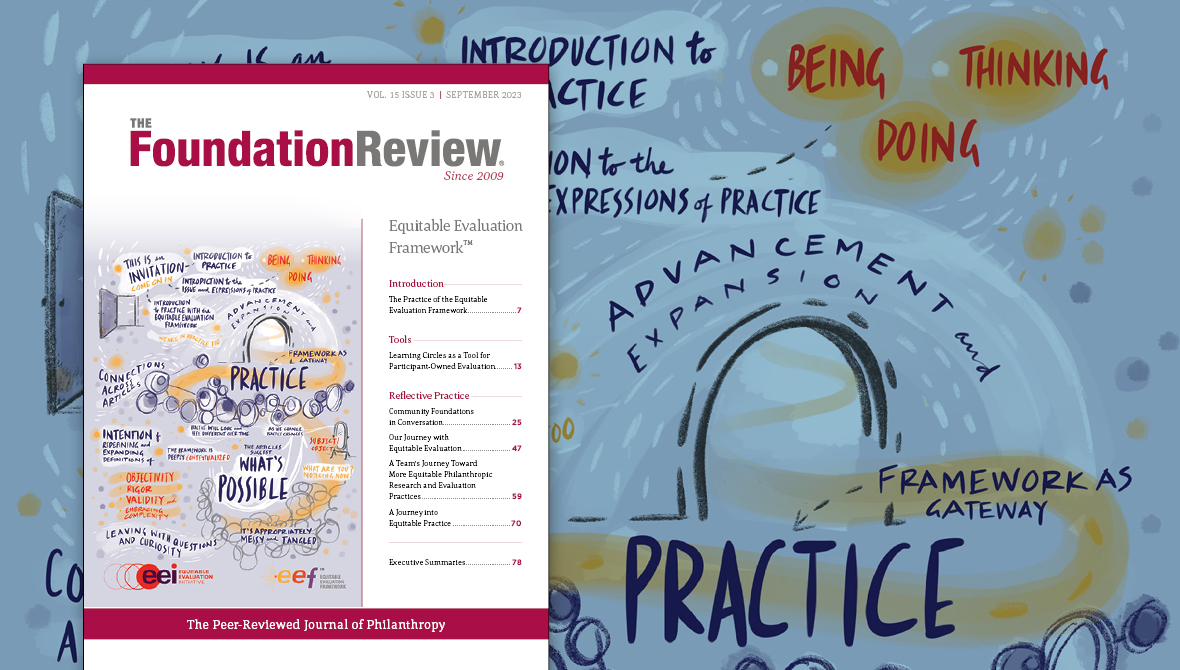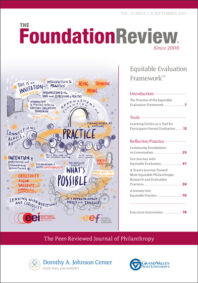Equitable Evaluation Framework™


 This issue of The Foundation Review is somewhat unusual in its focus on a particular approach, the Equitable Evaluation Framework™ (EEF). It is also unusual in that the authors were encouraged to explore their personal experiences with using the EEF, including not only their intellectual but their emotional reactions to exploring and seeking to apply it.
This issue of The Foundation Review is somewhat unusual in its focus on a particular approach, the Equitable Evaluation Framework™ (EEF). It is also unusual in that the authors were encouraged to explore their personal experiences with using the EEF, including not only their intellectual but their emotional reactions to exploring and seeking to apply it.
The EEF is primarily a way to help us think differently about how knowledge is created, who gets to be part of the creation of knowledge, and how power may be wielded differently based on different ways of knowing. Although some standard evaluation methodologies may be more amenable to practicing equitable evaluation, the EEF does not prescribe specific tools or practices, but rather a different conceptualization of the evaluative process. In keeping with the spirit of EEF, we used a different process to review the papers submitted for this issue. One review was done as a standard double-blind review, while a second review was done by a group of people familiar with EEF who submitted a collective review. This second process provided a much richer set of feedback for the authors than the typical peer review.
The first article in the issue by Coné and Dean-Coffey introduces the Equitable Evaluation Framework™; the remainder of the issue provides examples of how it has been put into practice.
We hope this issue encourages you to think about how you know what you know.
For many, this special issue of The Foundation Review is an introduction to the Equitable Evaluation Framework™ and how some folks in U.S. philanthropy are reimagining evaluation, learning, and research through its practice. This article provides an overview of the framework and the initiative that has worked over the past three years, in partnership with many, to “be in practice of the EEF.”
Learning circles are an approach where individuals with a common interest meet regularly to learn from each other about a self-identified topic in a format chosen by the group. Kansas Health Foundation and its strategic learning partners, Innovation Network and Harder+Company Community Research, are exploring learning circles in two of the foundation’s initiatives. This article shares the authors’ individual experiences and collective reflections on using learning circles as a took in practicing EEF.
This conversation between staff at the Oregon Community Foundation and the Hartford Foundation for Public Giving shares how they are infusing the Equitable Evaluation Framework™ into their practice as they aim to be less extractive, shift power, and honor all ways of knowing and being as valid. This article is a rough transcript of their discussion, starting with these questions: 1) Why is applying the EEF principles and challenging orthodoxies important for your practice? How is this approach helping us show up authentically? 2) What does applying EEF principles/challenging orthodoxies look and feel like for you now? How are you infusing it into your work? Where does it feel easier or harder, and why? 3) Where do you hope to go from here? What does applying the EEF look like for you in the future? The authors speak to the many ways that this work can “look” and the ways that the journey of each foundation is shaped by its starting place, mission, and culture.
The Health Forward Foundation recently completed a two-year journey with the Equitable Evaluation Institute as a practicing partner. In this article the authors discuss the journey and how they experimented with some of key concepts through a project called Stories in Power. A collection of voices detailing how members of a community have experienced their own power — or their lack of it — in making decisions that affect their lives, Stories in Power provided a concrete example of how their work can be different and helped them to lay a foundation for new ways of thinking about evaluation.
This article describes the journey of the Research and Evaluation team at the Annie E. Casey Foundation to develop an approach that would allow them to rethink and deepen how they, as funders of research and evaluation, center equity in their practice. The core lessons that they have learned: view tension as an opportunity for creativity; build in and protect space and time for reflection; and develop rapport and trust to strengthen practice.
Six staff members from the Michigan Fitness Foundation participated in the Equitable Evaluation Initiative (EEI) where they learned about the principles of the Equitable Evaluation Framework™, engaged with inspiring podcasts and articles, discussed equity issues in small groups, and benefited from the guidance provided by the EEI leaders and peer practice partners. That experience led to different ways of thinking, learning, knowing, being, and doing. They started to use “equity language” with intent, words such as transformative, framing and reframing, community of practice, relational, accountability, shifting mindsets, and community voice. New ideas to advance equity became a staple in conversations. These new ways of thinking at times caused discomfort and tension. But changes did happen; and the more they changed, the more they changed.
Not yet a subscriber to The Foundation Review?
Start your free 90-day trial today!